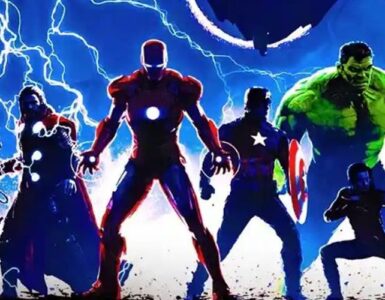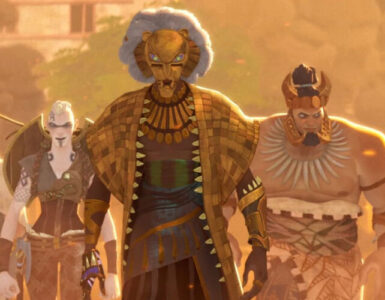At this point, any Marvel Studios project is basically a numbers game. With 32 movies and 10 streaming shows across 15 years, and an ensemble of over hundreds of key actors, directors, writers and producers involved in building the Marvel Cinematic Universe (MCU), it can be daunting for a newcomer to step into the massive universe.
But try telling that to African-American filmmaker Nia DaCosta, of 2021’s Candyman fame. At 33, this trailblazing New Yorker is not only the fourth woman to helm a Marvel blockbuster, following in the footsteps of Anna Boden (Captain Marvel), Cate Shortland (Black Widow), and Chloé Zhao (The Eternals), but she also stands out as the youngest and the first African American woman to direct within the MCU’s storied halls. With The Marvels, DaCosta is poised to redefine superhero storytelling through her unique lens.

The sequel to Captain Marvel (2019) sees the return of Brie Larson as the space faring hero, reuniting her with old friend Monica Rambeau (Teyonah Parris), and Kamala Khan (Iman Vellani) aka Ms Marvel, and is the third chapter in the current Phase 5 of the MCU that serves as a pivotal juncture in the MCU’s ever-expanding Multiverse Saga, promising to set a new standard for what it means to be a hero and a desire for viewers learn more about Carol Danvers beyond her feats of strength in the first Captain Marvel movie and Avengers: Endgame.
“In this movie, audiences will learn a lot about her character that they didn’t learn before. In the first film, she has no memory. And then by the time she gets it, it’s 30 years later, and she’s beating up enemies and crashing through ships, and we don’t really have time to pause and learn who she is,” the filmmaker pointed out in an interview with Geek Culture.
“I wanted to make sure that we got a look into her past, while also thrusting Kamala and Monica into her life.”
DaCosta also delves into the complexities of merging these stories into a cohesive sequel, as her film serves as a continuation of the Ms. Marvel series on Disney+, but along with introducing Monica, the film’s all-women cast and crew for key roles (DaCosta also co-wrote the movie’s screenplay) is undeniably a nod to inclusion.
The MCU spectacle, which also stars Zawe Ashton, Park Seo-joon, and Samuel L. Jackson, is also set to be a robust reinvention of the superhero archetype by crafting a narrative that boldly redefines heroism through the lens of diversity and familial bonds.
“It’s really exciting to have three very different women at the centre of the film,” says DaCosta of her three leading ladies, who represent vast demographics, yet each carries a deeply personal narrative, one that resonates with DaCosta herself.

“Ms. Marvel was actually someone who I love from the comics, so being able to bring her to the big screen was really huge for me,” she adds, underscoring her personal investment in these characters.
Unifying the distinct arcs of such vibrant characters was a deliberate act, interweaving their individual journeys to amplify their impact on one another. As such, it was important for the filmmaker to make sure their individual stories had an influence on one another, such that “them overcoming their own issues was instrumental in them connecting.”
Through this exploration, The Marvels becomes a tapestry woven with threads of legacy, identity, and growth, grounded in the lives of its protagonists.
Still, with The Marvels fitting into the larger tapestry of the MCU’s Phase Five, DaCosta was also mindful of the interconnectedness required for future narratives, and was very careful in describing her involvement, especially since her film marks the introduction of key players into the franchise.
“I really tried to let Marvel leave me in that way, because they have this big plan, the universe is expanding, and you have to be more and more careful about what happens in each thing, because you want to make sure that, you know, you’re setting up whatever they’re going to do on the Avengers and Secret Wars and all that stuff,” noted the filmmaker, referencing the MCU’s long-term plan for the characters to come together in the upcoming Avengers: Secret Wars.
“So, you know, I really leaned on them to guide like, Okay, what would be possible in this movie? What was going to be okay, and what could we keep? Or what should we stay away from, in order to make sure the overall arching story worked.”
Amidst the high-octane action characteristic of superhero films, the movie does not shy away from larger thematic explorations. DaCosta infuses the narrative with an exploration of the weight of responsibility and the strength derived from familial connections.

“Carol feels as though she has the weight of the world – the universe – on her shoulders, but the importance of family is what helps her have the strength to take on the world,” she affirms, recognising this as a central theme that she passionately wove into the film’s fabric. “That’s why she and Monica’s relationship was so important in the movie.”
The relationship between Carol and Monica as estranged aunt and niece, along with the integral role of the Khan family in Kamala’s life, becomes a testament to the shared experience of how familial ties empower the heroism of each protagonist. Instead of a solitary endeavour, superheroism is presented as a collective in The Marvels. It’s a poignant reflection of our times, where community and connection are increasingly recognised as sources of resilience and empowerment.
In The Marvels, DaCosta not only presents a story where diverse women take the lead but also posits that heroism, at its core, is an experience enriched by the diversity of those who wear the mantle and the families – born or made – that support them.
Ironically, DaCosta has also had to depend on Marvel Studios for support, as the pandemic extended the production of the movie, from two years to three and a half years, eating into her window to start production for her next film, Hedda, starring Marvel alum Tessa Thompson. Her move to London earlier this year, while The Marvels was in post production, was deemed as one that ruffled the feathers of Marvel execs, prompting DaCosta to have to explain herself, even though it is almost a Hollywood norm for directors to start production for a new film while still in post-production for another. Some have called out this double standard targeted at a female director, when male directors do the same, but are not called out negatively for it.
The Marvels releases in theatres on 9 November.













